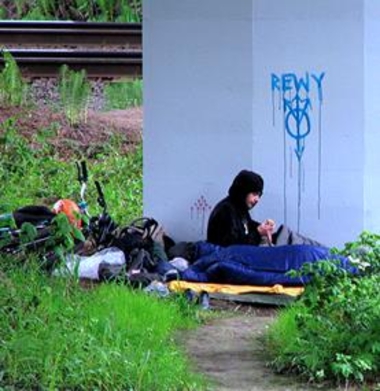Post marriage equality we need to get our priorities in order

By Glen LeCarl
Whoa... not so fast!
As the celebration of marriage equality winds down our community appears poised to pivot toward, and bring the primary focus of our formidable influence, to the fight for passage of the Employment Non-Discrimination Act (ENDA). It may seem the obvious course. After all, as the saying goes, a gay or lesbian person can get married in the morning and fired in the afternoon. Only twenty one states protect against employment discrimination on the basis of sexual orientation, and a mere eighteen on gender identity. However there is a need more urgent, one literally of life and death--namely homeless lesbian, gay, bisexual, transgender and questioning (LGBTQ) youth. The time is now that they be not just A priority at long last, but the top priority moving forward.
Fully 20-40 percent of the approximately 1.5 million homeless youths in America identify as LGBTQ, based on numerous studies. Over the past almost two decades I have been engaged on this issue these dismal statistics have proven stubbornly resistant to change. Studies also show that a youth's LGBTQ identity is often a major contributing factor to becoming homeless, if not the cause altogether. Once homeless, LGBTQ youth face a myriad of risks, including: suicide, violence, HIV/AIDS and other sexually transmitted diseases, prostitution, and substance abuse/dependence.
Greater access to LGBTQ specific and LGBTQ- friendly services, with the necessary competencies and experience, are sorely needed. There are a number of amazing foundations and service organizations around the country, such as Cyndi Lauper's True Colors Foundation, the Ali Forney Center in NYC and Larkin Street Youth Services in San Francisco attempting to raise awareness and/or directly address the plight of homelessness among our youth. Yet these organizations have been de facto charged with the responsibility for addressing a crisis that in scope and scale is far beyond their resources and capabilities.
Marriage equality is just the latest on the list of our most consequential victories to date. HIV/AIDS has gone from being a terminal to potentially manageable chronic condition (for those with access to life-saving medications), DADT and DOMA have fallen, we now enjoy protections in federal government employment and contracting, polls consistently show we have won the hearts and minds of an ever-increasing majority and corporate America largely has our backs. However, most national level successes have been to the sole benefit of LGBT adults.
My life-partner, now husband, of sixteen years and I are no exception; our ability to be legally married and have our relationship recognized by the federal government has been a huge advantage to us personally. I am grateful for that. I am certainly mindful, as well, of the ongoing and important efforts to address the numerous issues in addition to ENDA that remain before us, including: transgender equality; equal access to adoption; countering so-called religious freedom legislation and executive orders; and securing equality in housing, public accommodation, senior care and facilities, etc.
But when community leaders and pundits discuss the work ahead in the wake of Obergefell v. Hodges, I am disheartened at what I do not hear. Homeless LGBTQ youth rarely, if ever, rate a mention.
To be fair, our national leadership is not entirely AWOL. One example is the campaign to end anti-LGBTQ bullying which may help reduce a contributing factor toward homelessness among some LGBTQ youth. The Student Non-Discrimination Act (SNDA) is a complimentary effort to address bullying and equal opportunity in education. Another example is the advocacy around the Runaway and Homeless Youth Inclusion Act (RHYIA) which would help ensure that programs funded by the Runaway and Homeless Youth Act (which must be renewed) serve LGBTQ youth effectively and without discrimination.
We've all heard of ENDA, chances are the same cannot be said for SNDA or RHYIA. There is good reason for that. For all the gains they have labored hard to help secure, and for which they can be rightly proud, the professional activist class of our community has been ineffectual in advancing the cause of homeless LGBTQ youth. Furthermore, our national leadership has consistently failed to embrace a sense of urgency regarding the crisis, let alone respond accordingly. This is shameful, especially when you consider the vast wealth, power, access and media profile that has been marshaled by our community in securing the aforementioned victories.
Unless our national organizations and biggest donors wake up and similarly prioritize homeless LGBTQ youth, RHYIA and SNDA will languish, services will remain inadequate and overall progress will be incremental at best. Absent that top level commitment going forward, we will have to ask ourselves what kind of community we are, what kind of a people we have become, that amidst such tremendous success we neglect the most vulnerable among us.
Glenn LeCarl is a disabled veteran and U.S. Naval Academy alumnus based in Tallahassee, FL.
The Gayly – July 27, 2015 @ 12:30pm





